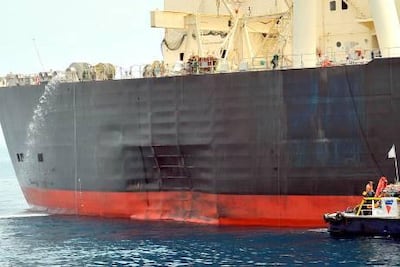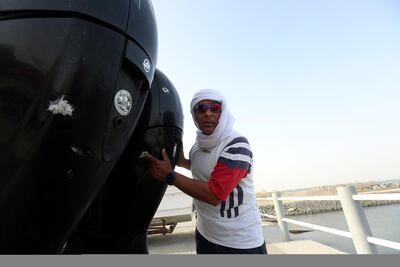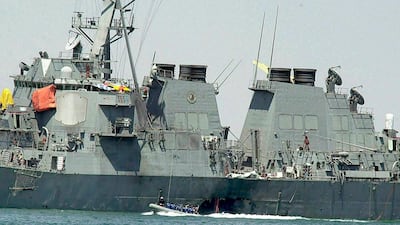Four ships were “sabotaged” off the coast of Fujairah on Sunday, according to the UAE and Saudi governments. However, it is not the first time that the vessels have been targeted in the Gulf region.
Despite being one of the most important strategic waterways in the world – and one of the best defended – naval attacks are rare but not unheard of.
Here, we look back on some of the other incidents which have occurred in the region over recent decades.
The Japanese supertanker

When the M Star, a large Japanese oil tanker, was damaged as it passed the Strait of Hormuz in 2010, initial theories included that it had been hit by a freak wave.
However, it later emerged that home-made explosives had been the cause of a large dent in the vessel, which was carrying two million barrels of crude oil from Qatar to Japan. Traces were found on the hull by investigators.
A group with links to Al Qaeda, a battalion of Abdullah Azzam Brigades, claimed responsibility for the explosion, which injured one person. It said a suicide bomber had been responsible.
The American destroyer
In perhaps the most infamous naval attack in the region, the USS Cole was targeted by terrorists while it was refueling in Yemen’s Aden harbor in October 2000.
Suicide bombers attacked the ship in a small boat laden with explosives. A hole was ripped in the side of the Navy Destroyer, killing 17 US sailors and injuring 39.
It was attributed to Al Qaeda, and is now seen as a precursor to the September 11 attacks on New York, carried out by the same group and taking place less than a year later.
A militant convicted of plotting and taking part in the attack, Jamal al-Badawi, died in a targeted US air strike on January 1 this year on the east of the Yemeni capital, Sanaa, Donald Trump, the US President, has said.
The Emirati fishing boat

Only last year,a fleet of Emirati fishing vessels was fired upon by suspected pirates while searching for tuna in the Gulf of Oman, according to boat crews.
A captain and crew showed photos and video footage of their engines riddled with bullets. The pirates "appeared out of nowhere" and started shooting, Yousef Baroun, a 52-year-old Emirati fisherman, told The National.
He described four pirates on a boat with no flag and said the guns they used appeared to be Kalashnikov AK-47-style assault rifles. He said he was not sure what nationality the men were.
The fleet was about 90 kilometres off the coast of Fujairah in international waters when the encounter took place.
There were also reports of pirate activity in the Gulf of Oman in 2011.
The French tanker
The 158,000 tonne Limburg supertanker was rocked by a huge explosion off the Yemeni Coast in 2002, killing one crew member and injuring 12.
It was attacked by a suicide bomber in a smaller boat, in an incident also attributed to Al Qaeda and was said to have “chilling similarities” to the USS Cole bombing.
In 2014, a Saudi man, Ahmed Al Darbi, pleaded guilty to five charges related to the bombing. He was being held at the US military prison in Guantanamo Bay at the time.
Prosecutors said Al Darbi had helped plan the bombing, including buying the boats involved in the attack. At the time of the attack he was already in US custody.

